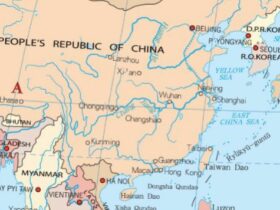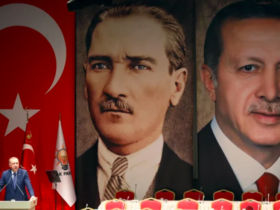By Cansu Yiğit
The Uyghur Tribunal published its final verdict on the so-called Uyghur Genocide on their website. The document named “Uyghur Court Decision Summary Form” consists of 63 pages and 210 articles. The so-called trial lasted more than a year. The last session of the court was held in England on 9th of December, 2021. All of the court members are resident in England.
To be honest, I was quite surprised when I read the document. I went through all the pages and took some notes. I wasn’t expecting anything new, because most of the allegations were already fake footage or anonymous witnesses without evidence, and so, many of them turned out to be irrelevant or refuted.
The court panel is impressive: Sir Geoffrey Nice (President), Nick Vetch (Vice-President), Tim Clark, Professor Raminder Kaur, Professor Dame Parveen Kumar, Professor David Linch, Professor Ambreena Manji, Professor Audrey Osler, Catherine Roe.
Before you read the text of the resolution, you would think that these ambitious names would find something really big. Names, titles, businessmen, Sirs, professors… but the document itself is a total disappointment. Not that it is anything new, but the document is highly deceptive, contains many contradictions and, most importantly, is a huge disappointment for the Uyghur Diaspora.
But why?
Let’s examine the first noticeable contradictions.
Legal foundation of the court
This so-called trial, on which the diaspora had great expectation, is actually led by people who have no authority and by adjectives without an institution.
Article 198 of the document states:
“The Tribunal has no power of any kind to sanction the PRC or individuals in the PRC. It assumes politicians, civil society, NGOs and powerful individuals who may have some powers of sanction and who can make their voices heard on issues to which this Judgment may relate, will do so.” P.57
Are there witnesses?
The court took into account the individual statements of people who were referred to by the Diaspora and who described themselves as witnesses. These people and the institutions they represent had tried to spread these claims from public sources with documents, photographs or videos, but careful eyes quickly found the truth and proved that the documents, images and photographs were not related to the truth. Those who made these news and posts had to delete or remove the news after a while.
In fact, the court often felt the need to state that the testimonies of these witnesses were not sufficient:
“Names of fact witness are not included in the present text but will be in the full document once any security issues are resolved.” P.1
“12. These allegations have not been dealt with in a public evidence-based way by the UN, by courts, national or international, or by governments save – without publication of its reasoning – by the US.” P.3
Is the court unbiased and without prejudice?
The court often claims to be unbiased and impartial. This claim is confusing when you look at the work of the names in the delegation. It is seen that many people in the court committee have been taking sides on the issue for a long time. It can be clearly seen that their cultural ties with Asia are severed. In addition, the court, which is known to accept the case at the request of the World Uyghur Congress, also states that it has dismissed the baseless accusations of the US foreign ministers, as frequently stated in the text of the decision. Moreover, the “trial expenses” belong to the World Uyghur Congress! This so-called court, which has no official status, says that it also asked for documents from the PRC, but could not obtain them. This should be a surprise for a country with 5000 years of civilization heritage.
“67-c. The UK Government has been in contact with the Tribunal from time to time. The Government has assisted the Tribunal at the Tribunal’s request with securing visas for some witnesses coming from overseas to give evidence at both the June and September hearings of evidence in London.” P.23
Mass killings
The court notes that there is no document or evidence of mass murder. How a so-called genocide can take place without mass murder? The court does not comment on this.
“23. BUT there is no evidence of organized mass killings. Indeed, it is clear that detainees, are allowed back into society, sometimes after as short a period of detention as 3-6 months – often to be detained again – sometimes after long periods in detention and sometimes after sustained torture.“ P.7
“24. Marie van der Zyl, President of the Board of Deputies of British Jews wrote to Chinese Ambassador to the UK in July 2020; ‘Nobody could watch the segment of the BBC’s Andrew Marr show on which you appeared yesterday and fail to notice the similarities between what is alleged to be happening in the PRC today and what happened in Nazi Germany 75 years ago: People being forcibly loaded onto trains; beards of religious men being trimmed; women being sterilized; and the grim specter of concentration camps.’ Such images have led others to make comparisons with the Holocaust and it was, of course, the Holocaust that led to ‘genocide’ becoming a term of general use and then a defined crime. Such comparisons may be well intentioned but are unhelpful. But the evidence of what has happened to the Uighurs is not the Holocaust, not just because of the lack of evidence of mass killings but also because of the return of those detained to society – never something intended for Jews taken to concentration or death camps.” P.7
“26. The Tribunal has had all these matters in mind, together with a need to respect how the term genocide came into existence because of the suffering of the Jews, in its review of the law and the facts, especially in its consideration of the allegations of genocide.“ P.8
Reports and facts submitted to the court
When the tribunal asked its interlocutors for the reports it had included in the hearings as evidence, it received interesting answers. The truth that emerged in the end is that these reports reflect subjective perspectives. At some point, the court has to admit that these ideas were not taken into account when making a decision. When the court requests reports from the authors they want to use as evidence in their sentencing, the authors unexpectedly refuse to submit these, saying they are “based on a set of publicly available evidence that we cannot independently verify.” The delegation, which called itself the court, admitted that the evidence in the reports put forward at the hearings was not confirmed. But even this confession did not prevent them from making a judgment.
“31. Opinions on final issues – whether crimes have been committed – have been read in reports and opinions, and heard in evidence, but no attention is paid to those opinions by the Tribunal.“ P.9
“42. The Bar Human Rights Committee Report identified routes to remedy in the event that crimes including crimes against humanity and genocide were proved. It expressed no opinions of its own on culpability of the PRC. The author of the Report was unable to give evidence to the Tribunal. “ P.14
“43. The Essex Court Opinion found there to be a credible case amounting to crimes against humanity and genocide. The authors led by Alison MacDonald QC declined to give evidence in support of this Opinion even before the imposition of sanctions by the PRC on her and on her professional chambers following which the Opinion was removed from the chambers’ website.” p.15
“14. She explained: ‘The legal Opinion which I and my colleagues drafted was not based on any independent factual investigations, but rather, as we set out in the Opinion, a range of publicly available evidence which we were not able to independently verify.“ p. 15
There is no genocide but there is!
One of the most striking parts of the resolution text is that it complains that the definition of genocide defined in established law is insufficient.
“49. Explaining – accurately – that State responsibility for breaches of the Genocide Convention is not a matter of criminal liability and that States may not be prosecuted or found criminally culpable for genocide it argues that the heightened criminal law standard of proof does not apply. Rejecting the need for proof beyond reasonable doubt it had applied a ‘clear and convincing’ standard of proof as sufficient for findings of breach of the Genocide Convention by a state.
50. Professor Packer and Mr. Diamond framed several important questions for the Tribunal to consider. However, the Tribunal is not the appropriate body to attempt to broaden the law on genocide or to run any risk of dealing with genocide other than by the strictest standard of proof, that of the ‘beyond reasonable doubt’ test. A people’s tribunal that does not apply established and readily understood law to facts proved according to the strictest test may well reduce its public value which comes from providing unassailable findings of fact and law for others to use. “ P.16
However, the court committee found a formula to expand the definition of genocide according to its own mind: Sociologist’s view!
“144. It is unrealistic to think that the legal concept of genocide can be severed completely from its sociological root(s). Indeed, some contemporary arguments for development of genocide’s legal scope – consider the Newlines Report above – clearly look for an expansion of scope where the legal test could be met by a number of observed activities, rather compatible with Dr Zwaan’s approach that allowed for many policies and intentions. And, as Newlines’ Professor Packer accepted in answer to the Tribunal when giving evidence, legally defined genocides are a section of the much larger collection of activities sociologists identify as genocides; sensing, from Dr Zwaan, how what is happening to the Uighurs appears to a sociology genocide expert may not be unhelpful for those having to focus on what may be a legally defined one. On intention itself the sociologist’s view – expressed firmly in Dr Zwaan’s written note – about the difficulty of proving intent is the lawyers’ recurring problem in genocide trials.” P.38
If you can stretch the articles of the Genocide Convention enough, you can argue that any state committed genocide against any group in your own mind. This is exactly what the so-called court does. Thinking that the birth policy implemented by a country with a population of more than one billion 400 thousand throughout the country will reduce the Uyghur population in the future, he concludes that the crime of genocide will be committed.
“189. And so it falls to this Tribunal to make clear on the basis of the findings above that the ‘unborn’ part of the Uyghur ethnicity of Xinjiang – calculated by consideration of the likely numbers of Uyghurs in years to come measured against the likely number of Uyghurs there would have been had the Uyghurs not been treated in the way they were by measures to prevent births – constitutes a ‘substantial part’ for purposes of the Genocide Convention.
190. Accordingly, on the basis of evidence heard in public, the Tribunal is satisfied beyond reasonable doubt that the PRC, by the imposition of measures to prevent births intended to destroy a significant part of the Uyghurs in Xinjiang as such, has committed genocide. “ P. 55-56
The charge of genocide has no legal basis
In line with the case law of the European Court of Human Rights, in order to have a legal basis for the allegations that the crime of genocide was committed in China’s Xinjiang Uyghur Autonomous Region;
1- A competent court within the borders of the Chinese state must rule that the crime has been committed. However, no such court decision has been taken in China so far.
2- Since the Chinese state is not a party to the International Criminal Court (ICC), it is not legally possible to be tried in this court for the crime of genocide. The ICC does not have the authority to judge states anyway. However, it can prosecute real persons who are presumed to have committed the crime of genocide.
3- The only institution that can accuse China of genocide is the International Court of Justice (ICJ). China is a party to the United Nations’ Genocide Convention. Therefore, another party to the Convention may apply to the ICJ to determine whether China has violated the Convention. However, since the ICJ is not a criminal court, it does not have the authority to hear a case regarding the prosecution of the perpetrators of the crime of genocide. It can only rule whether China is in breach of the Convention.
To date, no application for China has been made to the ICJ.
In summary, the accusations of genocide against China have no legal basis. Let alone a fabricated court, the legislative and executive organs of any country, parliaments and even irrelevant courts do not have the authority to take any decision on the crime of genocide. Those who took part in this fabricated court are also aware of this fact.
US-backed experts
All the arguments described as important in this and many other conflicting documents have been compiled from the reports or opinions of well-known names with anti-Chinese sentiment. When these names are examined, it is seen that most of them frequently write reports to the US government, the CIA or to universities or major think tanks that direct US foreign policy, and they are paid in return. Could the reports written from a subjective point of view, the briefings given, always be the reports created by these so-called experts by receiving certain sums in return?
















Leave a Reply